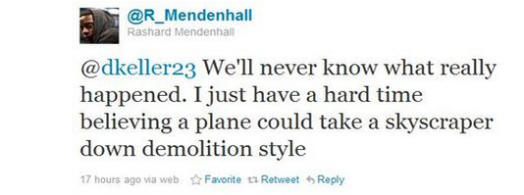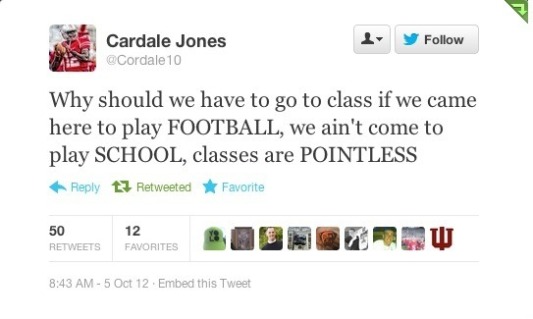As a twenty-one year old North American male, professional sports have always had a large impact on my life. I spend countless hours reading, watching, and living vicariously through people that I will probably never know, and who will never hear about me. I do it with enthusiasm and exuberance unmatched, and it takes effect on all aspects of my life; who I hang out with, what I spend my money and time on, even things like where I go out to eat.
Growing up in the time I did, I feel like social media has always been a part of my life, even though its really only been around for a few years now. I don’t know anyone in my peer groups who hasn’t had a Facebook account at least at one point, and I am constantly finding more and more of my friends investing their time in Twitter, LinkedIn, Instagram and other social media mediums. Lately these two passions of mine have become intertwined in a way that provides me an even larger benefit. It is becoming more and more common for professional athletes to create their own Twitter accounts, providing a platform to communicate with their fans without any intermediary pressures or editing. What it results in is a surprisingly honest look into professional athletes minds and attitudes, which would of previously been impossible. These athletes can send messages directly to their fans over twitter without their agent or organization’s approval, and you can see why some owners, especially ones of an older generation, are concerned about this freedom. This is magnified by the fact that these fine-tuned athletes are so tightly tied to their brand and image. The results from these first few years of twitter use by professionals can be described as fun, dangerous, stupid, and in some cases even ingenious, but it is always entertaining. It also leaves me wondering what direction social media in sports is heading in the future.
To say that all athletes are stupid would be an extremely large transgression, as many are actually quite smart and are successful in other fields after professional sports. However to say that sporting culture in North America is beneficial to nurturing proper academic growth is an oversight. Many of these high-end athletes, especially in basketball and football where physical characteristics are evident at a very early age, are taken out of the normal life of a kid very early. They are recognized for their talents in high school, and often put on a pedestal of achievement ahead of their peers, earning high social status, and media attention. Many are stars by their teen years and have much provided for them throughout their schooling. I imagine it would be hard to concentrate seriously on your education knowing you will be making millions in a few years when you devote yourself to your chosen sport. With all the attention and gratitude given to you over the years, it would be hard to come out of that level headed, and you can see why some athletes feel they can do no harm and are “above the law”. That in summation with the added scrutiny of being in the public eye at all times can cause a lot of potential problems when provided a medium like twitter. Professionals have made mistake after mistake on twitter, to the annoyance and frustration of their respective teams. It only takes a quick search on Google to find egregious tweets, a few of which I have provided below.
(Star pittsburgh steelers running back after the killing of Bin Laden)

(Star College football athlete)
When you see this kind of stuff send out by players via twitter, it makes you wonder why their owners and agents would even agree to let them use it, considering the potential backlash that they might incur. However when you research it a little bit you see some strong reasons that would justify giving players this freedom.
1) Fans LOVE it. As a fan of almost all professional sports, it really is quite easy to see why athletes with twitter draws fans in. These professional athletes are almost superhero’s to fans, and it was previously impossible to connect with them at all. Your only insight into them was seeing them at an overly expensive game, or in they’re after game interviews. Twitter provides so much more than an interview does by enabling athletes to escape from the textbook answers and robot like comments that they have been instructed to use as answers since teenagers. It lets them vent in times of anger, show signs of happiness, and comment on hot topics and issues, all of which gives you unprecedented viewership into their lives like never before. Often athletes will go to twitter to connect with their fans, having hour-long periods where they answer follower’s questions. Even if they don’t do that, its super cool to know that if you tweet something at your idol athletes, chances are that he will read it and hear your opinion.
2) Marketing: By shortening the distance between fans and the players, twitter opens up a medium that makes it extremely possible for a player to market himself, and his team. One former NBA executive believes that players should be encouraged to use Twitter.
“It creates an amazing opportunity for the athlete to build a fan base, making them exponentially more marketable, and has a tremendous rub-off effect for their respective teams and leagues.”
A player showing his personality though twitter can endear fans not only to him, but to the team itself by establishing a personal connection. However players can do more then market their team, they can promote themselves as well. For example, one of sports most famous “tweeters” Chad Ochocinco, who has over 1.4 million followers, used twitter to promote his mobile phone game MadChad. He sent out 35 tweets promoting his game, of which his followers were sure to have seen at least one, and quickly jumped to being one of the top five apps downloaded at the time. He used his twitter to market the game instead of other costly means, and it paid huge dividends for him.
3) Public Image: Also players who have made mistakes in the past can use twitter to try to tweak the public image in their favor. If a popular athlete is considered an angry of mean person by the public, twitter can be an effective tool for them to use to convey nice and personable messages, or even promote charities and foundations.
In the end I think that twitter’s impact on sports professionals may just be starting. Although there are negatives I simply believe that the positives and potential in twitter heavily outweighs the negatives. Also this is sort of the first generation of twitter using athletes, and as younger kids come who have grown up in the social media era, they will be more knowledgeable as to the proper uses of this forum. I would not be surprised at all to see it become mandated for players on teams to have twitter, and a concentrated effort to connect with fans by doing this could potentially be very beneficial.
Madison Weber
0725217
http://gigaom.com/2012/09/24/pro-athletes-on-twitter-execs-say-marketing-outweighs-gaffes/
http://www.sportsnetworker.com/2010/11/21/pros-cons-athletes-on-twitter/
